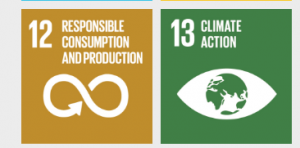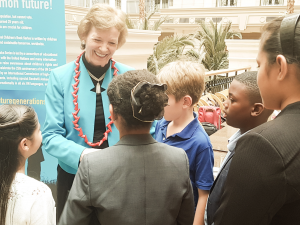12 August is International Youth Day and this year’s theme is about achieving the 2030 Agenda for Sustainable Development. It focuses on the leading role of young people in ensuring poverty eradication and achieving sustainable development through sustainable consumption and production (Goal 12 of the Sustainable Development Goals).The 2030 Agenda for Sustainable Development defines sustainable consumption as the use of products and services that meet the basic needs of communities while safeguarding the needs of future generations.

Goal 12 of the SDGs Ensure sustainable consumption and production patterns and Goal 13 of the SDGs Take urgent action to combat climate change and its impacts.
The Mary Robinson Foundation – Climate Justice believes that this is consistent with the principle of intergenerational equity. In its simplest form international equity can be understood as fairness between generations.
Growing inequality, extreme poverty and the threat of climate change bring into focus the fact that the actions (or inactions) of the present generation can jeopardise the rights and wellbeing of generations yet to be born. This hastens the need for responses that enhance equity between generations. Intergenerational equity is entirely consistent with a climate justice approach, which links human rights and development to achieve a people-centred approach, safeguarding the rights of the most vulnerable and sharing the burdens and benefits of climate change and its resolution equitably and fairly.
According to the United Nations, the development and promotion of individual choices and actions that increase the eco-efficiency of consumption of all and minimise waste and pollution is critical to achieving equitable socioeconomic development. Yet, many young men and women face barriers to certain green consumption choices. Those barriers to sustainable consumption choices include the high prices of goods and services and a lack of information about the available choices.
Agenda 2030 believes that increasing resource efficiency and moving toward sustainable production can contribute significantly to meeting the basic needs of all people, including youth, by making food, water and energy more accessible and affordable to those living in poverty. Investing in sustainable production also creates new markets and employment opportunities and helps ensure the social inclusion of all persons in their societies everywhere.
By focusing on the social development dimensions of sustainable consumption and production, this year’s International Youth Day theme places an emphasis on a cross-sectoral approach to sustainability and the vast social, political, economic and environmental interlinkages needed to achieve it.

Mary Robinson meeting some of the young authors at the Voices of Future Generations Event co-hosted by the Foundation and the Voices of Future Generations Initiative.
Young people hold a legitimate interest in the implementation of the 2030 Agenda for Sustainable Development and the Paris Agreement. Their concerns extend beyond the lifetimes of the negotiators working in both processes, yet the climate and development agendas currently adopted by Governments will ultimately determine whether the world in which they live out their lives offers opportunities in terms of quality of life, personal safety and equity. As a recognised civil society actor, the youth constituency has demonstrated its eagerness to participate in UN meetings on climate change and sustainable development and has actively championed issues of intergenerational equity and the rights of future generations. However it is important that this engagement is meaningful and available to young people from all countries. This requires the provision of support to enable young people in developing countries to be represented to a similar degree to their developed country counterparts. Effective youth engagement includes facilitation to input into high-level events, provision of technical support and the establishment of a review of youth participation in international negotiations.
Perhaps more than any other problem humanity has faced, climate change confront us with the reality of our interdependence. It is as morally unacceptable to allow uncontrolled climate change to happen as it is to tolerate the existence of extreme poverty in the 21st century. No country alone can protect their citizens from the impacts of dangerous climate change. All countries and citizens must act together motivated by enlightened self-interest and human solidarity for a better future. A global phase-out of carbon emissions can only work when it is done fairly and as part of sustainable development. A human rights approach provides the framework necessary for success. Zero carbon, Zero poverty the climate justice way would not only avert a catastrophic future but would precipitate a transition to a more equitable future defined by a social and international order in which the rights and freedoms set forth in the Universal Declaration of Human Rights, including freedom from poverty, are realised.
That is, after all, a world everyone is entitled to.


